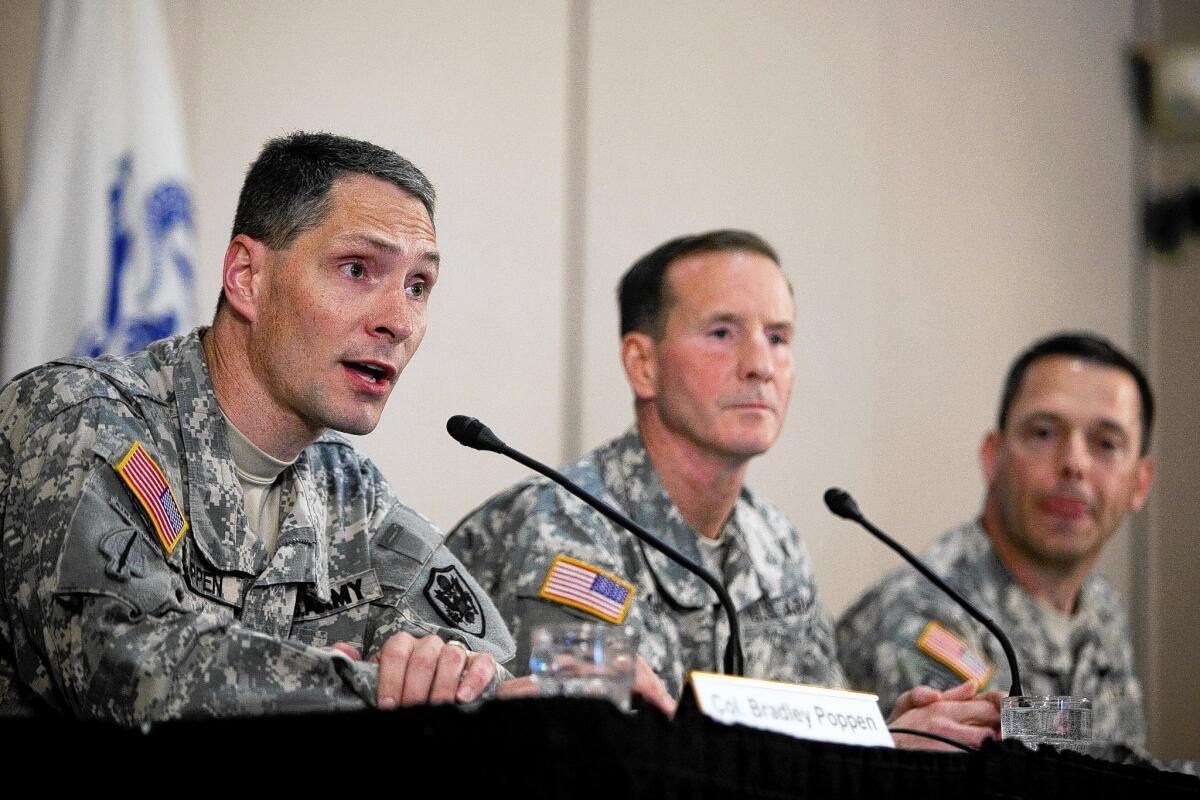Back in U.S., Sgt. Bowe Bergdahl probably faces a long recovery

- Share via
Reporting from SAN ANTONIO — Army Sgt. Bowe Bergdahl, who returned to the U.S. on Friday in good physical condition, probably faces a lengthy recovery adjusting to life after five years of captivity in Afghanistan, Army medical specialists said.
Bergdahl, 28, arrived at a near-empty hangar at Ft. Sam Houston from Germany, where he received initial medical treatment and counseling. No family or friends had come to meet him.
“He was in uniform, maintaining good deportment,” said Maj. Gen. Joseph P. DiSalvo, commander of U.S. Army South at Ft. Sam Houston. “We exchanged salutes. He appeared just like any sergeant would when they see a two-star general — a little nervous.”
Bergdahl was taken to the post’s hospital, Brooke Army Medical Center. He walked in without assistance and spoke to doctors in English, a language they said he had not been able to use while held by Islamic insurgent captors.
A senior U.S. official said doctors in Germany found Bergdahl physically healthy, but still struggling mentally from years of confinement in a small space and other harsh treatment.
They sent Bergdahl to Brooke medical center because its doctors specialize in what the Army calls “reintegration,” helping prisoners of war and kidnapping victims readjust to military and civilian society. Experts were still testing Bergdahl on Friday, with more evaluations planned this weekend, but said early results were good and showed he was in stable condition.
“We are pleased with his physical state,” said Col. Ronald Wool, a gastroenterologist supervising Bergdahl’s treatment.
During a Friday briefing here with DiSalvo and an Army psychologist who has met Bergdahl, Wool described how the treatment team was trying to prepare Bergdahl to interact with the outside world.
“It’s a slow decompression, to introduce him slowly to what’s been happening over the past five years,” Wool said.
A good sign: Bergdahl has started making choices, a right he had been denied in captivity, including what to eat.
“Peanut butter is a favorite,” Wool said.
The team has not talked to Bergdahl about the controversy surrounding his release, Wool said. The soldier’s hospital room does not have a television. He is not being held under guard, but he is also not allowed to leave the hospital on his own, an Army spokesman said.
Bergdahl was released May 31 in exchange for five Taliban prisoners from the U.S. military prison at Guantanamo Bay, Cuba. He had been held prisoner longer than any U.S. soldier since the Vietnam War.
His release touched off intense debate in Washington about whether the White House gave up too much and whether President Obama should have consulted Congress before agreeing to release the detainees. Last week, a homecoming celebration for Bergdahl in his small hometown of Hailey, Idaho, was canceled for fear of protests.
Obama has said he has no regrets about the exchange. Defense Secretary Chuck Hagel defended the swap this week, saying it was the “last, best chance” to get Bergdahl back and did not violate U.S. policy.
An initial Army investigation concluded that Bergdahl left his remote base in eastern Afghanistan without permission in June 2009, although his motive remains unclear. Some who served with Bergdahl said he deserted his post, imperiling fellow soldiers forced to search for him. The military is investigating those allegations.
Bergdahl’s parents released a carefully worded statement after his return. It was not clear how soon they might see him, officials said.
“While the Bergdahls are overjoyed that their son has returned to the United States, Mr. and Mrs. Bergdahl don’t intend to make any travel plans public,” said the statement released through the Idaho National Guard. “They ask for continued privacy as they concentrate on their son’s reintegration.”
Bergdahl is still technically in the Army, up for promotion this month. He could return to his unit in Alaska, be reassigned or discharged.
Doctors said there was no set timeline for Bergdahl to complete reintegration. Generally, the longer a captive is held, the longer it takes for him to reintegrate. But a lot also depends on an individual’s will to recover quickly, the doctors said.
“This case is particularly unique for its length,” said Col. Bradley Poppen, an Army psychologist who has worked with Bergdahl.
Bergdahl will determine the pace of his reintegration process and make his own decisions after years of captors doing it for him, Poppen said. This includes deciding when to meet with his family and friends.
He said Bergdahl had not seen media reports about his release or discussed it with soldiers.
“At some point he will be exposed to the controversy and the media,” Poppen said, but “we want to titrate that.”
molly.hennessy-fiske@latimes.com
More to Read
Sign up for Essential California
The most important California stories and recommendations in your inbox every morning.
You may occasionally receive promotional content from the Los Angeles Times.













